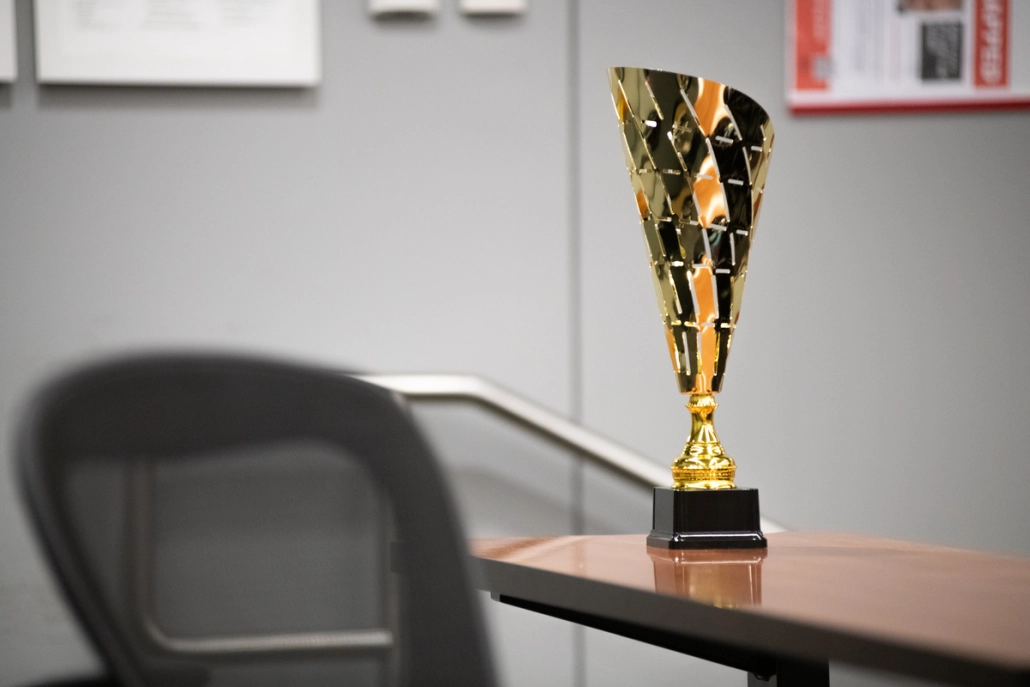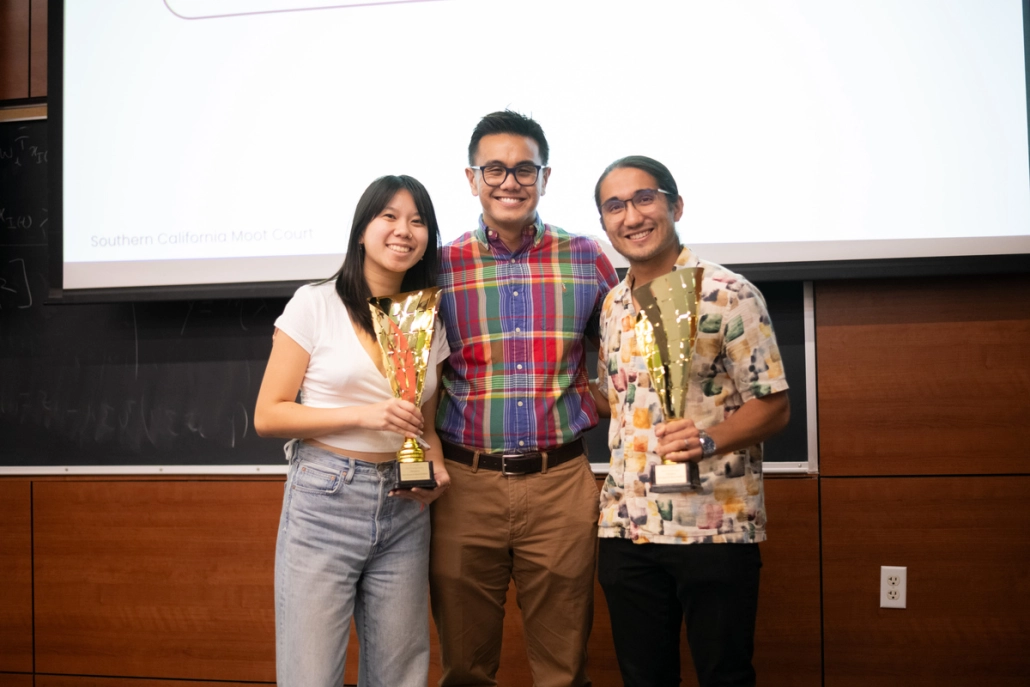After placing second in the nation in brief writing last spring in Baton Rouge, Louisiana, the Southern California Moot Court decided to host City of Angels, its first-ever regional competition, Oct. 28 and 29. The event brought in 58 individual competitors from across the country divided into 29 paired teams, and 80 judges from the greater Los Angeles area.
Daily headlines, sent straight to your inbox.
Subscribe to our newsletter to keep up with the latest at and around USC.
Marco DeBellis, a junior majoring in philosophy, politics and law and Spanish, joined moot court last spring and won the tournament alongside his partner Sian Salazar, a junior majoring in political science and global health.
Moot court is a club where students can practice appellate-style argumentation. The club provides two different ways to compete: brief writing — where any student can craft a written piece arguing either side of a case — and oral arguments — a selective in-person component where students present a 20-minute oral argument to a panel of judges who can, at any moment, ask them clarifying questions.
As opposed to mimicking an actual trial, which would be concerned with a guilty verdict, in moot court, both sides agree on the facts of the case and argue how the law applies to the case. They are judged on four categories: knowledge of subject matter, response to questions, forensic skill and courtroom demeanor, and clarity of argument.
SC Moot Court was created in 2019 by four students taking a pre-law Advanced Writing course taught by Antonio Elefano, a professor in the Writing Program and the faculty advisor for SCMC. The students had heard about moot court and wanted to bring it to USC. The work they put in paid off, and interest in the club increased over time, Elefano said.
Elefano, recognizing the extreme amount of time and effort involved, said he believed students should receive course credit and proposed a new Advanced Writing class in which students could learn the necessary skills for moot court in a classroom environment. The class has run every fall semester since Fall 2021.

Southern California Moot Court began in 2019 when pre-law students and Professor Antonio Elefano wanted to diversify legal debate at USC. (Jordan Renville / Daily Trojan)
“The students created the organization, they did the work, and I viewed it as sort of my responsibility to figure out a way to make it align with their course load and their curriculum,” Elefano said.
The prompt for every season is released in May, meaning the club has spent nearly six months preparing for the competition. Elefano hosted Zoom sessions throughout the summer for students to learn about the relevant case law. He expects students to learn the case law ahead of time, so the Advanced Writing class can focus strictly on argumentation.
Outside of class, there are two-hour practices at least twice a week along with asynchronous case research. All the work involved typically adds up to between 15 and 20 hours per week, DeBellis said.
Chloe Ghaleb, co-president of SCMC and a junior majoring in political economy, decided to host a regional competition after attending one at Yale University last spring. A Yale student had told her about the net benefits of hosting one’s own competition, including relieving the financial burden for students who can’t afford to travel and creating exposure for the team by reaching out to lawyers and students to judge or bailiff.
Ghaleb and her co-president, alongside Elefano, spent the last few months preparing for City of Angels, from writing emails to L.A. attorneys asking them to judge, to creating packets for sponsorships for judges, to booking caterers and scheduling classrooms.
“We spent all summer putting in a lot of work into [the competition], on top of the work that it already takes to plan tryouts and practices and everything outside of throwing your own competition,” Ghaleb said.
She also said that the weeks leading up to City of Angels were stressful, as one of the hardest parts of hosting is ensuring the tournament has enough volunteer judges. Because members were concerned about judges dropping out near the competition, they reached out to as many people as possible and ultimately ended up having too many judges.
After months of work, DeBellis said he was very proud to see everything come together.
“It was definitely stressful, but it was rewarding,” he said. “Since May we’ve been reading these cases, since May we’ve been doing the work with Professor Elefano in classes, and to see all that work pay off, it was the best feeling.”
Elefano said the hardest part of his role in hosting was dealing with the demanding logistics that presented challenges for being a helpful coach.
“It was stressful because judges canceling at the last minute, figuring out how to fill the rooms and get everyone into their rounds and everything –– all of that was stressful,” he said. “But you do it because the students that it draws, the people who are committed to doing this at this young an age are just extraordinary.”
The feelings of respect and admiration are mutual, as the team is extremely grateful for the support and teaching Elefano has provided.
“There isn’t another professor at USC or that we’ve ever met who puts in the dedication like Professor Elefano and who genuinely cares about the students like [he does],” he said. “He’s putting all this time outside of what his job description says to help us, and that’s at least 50% of the work that got us to where we went,” DeBellis said.
DeBellis said frequent collaboration is another huge factor that played into the team’s success.
“As a team, we can’t get to where we get without practicing against each other, hours on end just talking through arguments, losing track of time, because we all push each other to go forward,” he said.
SCMC sent five teams to compete in the competition, and by chance, DeBellis and Salazar’s team ended up facing another USC team in the round that determined qualification for pre-nationals. Since USC hosted the tournament, Elefano had the difficult task of announcing the results.
“I remember looking the way of the competitors who lost the round and seeing the smiles on their faces and just hugging [DeBellis] and [Salazar] because they were so proud of them and so happy for them,” Elefano said. “I think that encapsulates the spirit of the team: A win for any of us is a win for all of us.”
Ghaleb said that DeBellis and Salazar’s extreme work ethic and dedication are the main reasons for their success.
“College students [that] are already willing to put so much work and time and thought and effort into something just really shows how successful they are going to be as lawyers because that’s the sort of grit and dedication that’s necessary,” she said.
The regional level is ongoing, with the team attending two more regional tournaments in the near future. SCMC is almost certain that it is sending three teams to pre-nationals in January and have three teams that are yet to compete.
DONATION PLUG – PLEASE DO NOT TOUCH
Thank you for reading the Daily Trojan.
We are the only independent newspaper here at USC, run at every level by students. That means we aren’t tied down by any other interests but those of readers like you: the students, faculty, staff and South Central residents that together make up the USC community.
Independence is a double-edged sword: We have a unique lens into the University’s actions and policies, and can hold powerful figures accountable when others cannot. But that also means our budget is severely limited. We’re already spread thin as we compensate the writers, photographers, artists, designers and editors whose incredible work you see in our daily paper; as we work to revamp and expand our digital presence, we now have additional staff making podcasts, videos, webpages, our first ever magazine and social media content, who are at risk of being unable to receive the support they deserve.
We are therefore indebted to readers like you, who, by supporting us, help keep our paper daily (we are the only remaining college paper on the West Coast that prints every single weekday), independent, free and widely accessible.
Please consider supporting us. Even $1 goes a long way in supporting our work; if you are able, you can also support us with monthly, or even annual, donations. Thank you.
DONATION PLUG – PLEASE DO NOT TOUCH
Thank you for reading the Daily Trojan.
We are the only independent newspaper here at USC, run at every level by students. That means we aren’t tied down by any other interests but those of readers like you: the students, faculty, staff and South Central residents that together make up the USC community.
Independence is a double-edged sword: We have a unique lens into the University’s actions and policies, and can hold powerful figures accountable when others cannot. But that also means our budget is severely limited. We’re already spread thin as we compensate the writers, photographers, artists, designers and editors whose incredible work you see in our daily paper; as we work to revamp and expand our digital presence, we now have additional staff making podcasts, videos, webpages, our first ever magazine and social media content, who are at risk of being unable to receive the support they deserve.
We are therefore indebted to readers like you, who, by supporting us, help keep our paper daily (we are the only remaining college paper on the West Coast that prints every single weekday), independent, free and widely accessible.
Please consider supporting us. Even $1 goes a long way in supporting our work; if you are able, you can also support us with monthly, or even annual, donations. Thank you.

